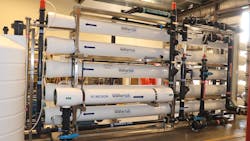Advanced Watertek installs RO plant in isolated village
Advanced Watertek, a membrane-based water treatment company, has recently helped build a new reverse osmosis desalination plant in Kumzar, Oman.
The isolated village situated along a major global trade artery, the Strait of Hormuz, had relied on desalination for their drinking water supply from a plant over a decade old. Because of this, the plant operator appointed Advanced Watertek to build a new plant with higher production capacity and energy efficiency.
The village’s location brought about a unique transportation challenge: Kumzar is only accessible by boat from the nearby city of Kasab. Being a small port, only small ferries, dhows, or speed boats are locally available for carrying of cargo to the island. Special army vessels are commissioned for larger consignments if required.
Keeping size restrictions in mind for transportation, loading, and unloading without any lifting equipment, the design team at Advanced Watertek worked hard to find a solution to the challenge. The team visited the site and designed an RO system using what they called the ‘nuts-bolts method’: components were dismantled for easy handling and transportation and then re-assembled on-site. The dismantled parts were conveniently transported using boats locally available at Kasab.
As simple as it sounds, it is a job that requires skill and technical know-how to ensure proper functioning as per design specifications. Eliminating the use of a special vessel for transportation was a significant cost saving for the client.
“We’ve built thousands of systems in the past 35 years, but each job is unique,” said Mohammad Farghaly, CEO of Advanced Watertek, in a press release. “This project had various challenges… but we made it happen!”
The system capacity of the old RO Plant was 100m3 per day, while the new RO plant was designed to have a system capacity of 300m3 per day. This capacity increase required several more membrane vessels, as well as higher feed pump and high-pressure pump capacity and size.
Advanced Watertek also introduced an energy recovery device into the design to recover wasted high pressure brine energy, in turn reducing the high-pressure pump and motor size as well as lowering energy consumption. The result was a higher-capacity, energy efficient system without considerable increase in the overall footprint of the system.
“Not only did we deliver a compact yet flexible construction, but the client saved approximately 40 percent of their energy consumption by the introduction of an Energy recovery device into system design,” said Farghaly.
